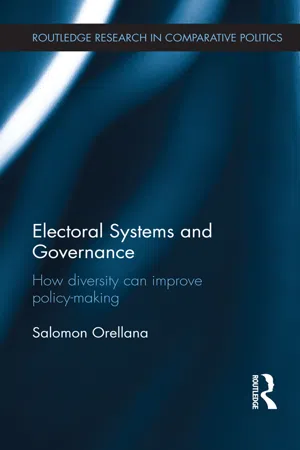
Electoral Systems and Governance
How Diversity Can Improve Policy-Making
- 166 pages
- English
- ePUB (mobile friendly)
- Available on iOS & Android
About this book
Diversity and dissent have been shown to improve decision-making in small groups. This understanding can be extended to the political arena and in turn it can enlighten ideas about policy-making.
This book focuses on the relationship between electoral institutions and policy outcomes in order to effectively explore the impact of diversity and dissent on the political arena. In doing so, it provides an empirical assessment of three key areas:
- the diversity of political information.
- policy innovation.
- pandering.
Drawing on economics, psychology, organization theory, and computer science, this innovative volume makes an important contribution to scholarship on the impact of electoral systems and the democratic nature of governments.
This book will be of interest to students and scholars of governance, electoral systems, representation, comparative politics, public policy, democratic government and political theory.
Tools to learn more effectively

Saving Books

Keyword Search

Annotating Text

Listen to it instead
Information
4 How electoral systems can influence policy innovation
Table of contents
- Cover Page
- Half Title Page
- Title Page
- Copyright Page
- Table of Contents
- List of illustrations
- Preface
- Acknowledgments
- List of abbreviations
- Introduction
- Theory: electoral institutions, diversity, and policy problem solving
- Electoral systems, party systems, and political information
- How electoral systems can influence policy innovation
- Electoral institutions and pandering
- Electoral institutions and elite extraction
- Conclusion
- Appendix
- Bibliography
- Index
Frequently asked questions
- Essential is ideal for learners and professionals who enjoy exploring a wide range of subjects. Access the Essential Library with 800,000+ trusted titles and best-sellers across business, personal growth, and the humanities. Includes unlimited reading time and Standard Read Aloud voice.
- Complete: Perfect for advanced learners and researchers needing full, unrestricted access. Unlock 1.4M+ books across hundreds of subjects, including academic and specialized titles. The Complete Plan also includes advanced features like Premium Read Aloud and Research Assistant.
Please note we cannot support devices running on iOS 13 and Android 7 or earlier. Learn more about using the app